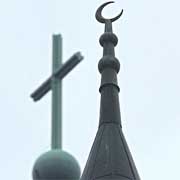The U.N. Special Rapporteur on freedom of religion or belief, Asma Jahangir In her report to the UN Human Rights Council, notes with concern that freedom of religion or belief is not a reality for many individuals throughout the world. She reiterated her concerns at a special meeting with non-governmental organizations (NGOs) on March 28 at the UN Palais des Nations in Geneva.
Responding to a question from the U.N. representative of the Seventh-day Adventist Church, Jonathan Gallagher, she said that her religious freedom mandate was “wide and important, and as deep as you want to go,” and because of limitations on financial and human resources, she had addressed “so far only the periphery.”
At the 27 March meeting the Human Rights Council discussed Reports on freedom of religion, freedom of opinion and expression, and on arbitrary detention. The Special Rapporteur Asma Jahangir said, many of the allegations she had heard were alarming, yet there were also initiatives by Governments and civil society which were creative and capable of diffusing religious tensions. Preventive measures were a crucial tool in promoting religious tolerance and challenging the forces of intolerance. Torture by State agents was occurring aimed at making people abandon their faith. Governments turned a blind eye to threats meted out to lawyers. Women suffered from humiliation in the name of religion. Imposition or prohibition of dress codes for women was widely reported. In some countries women were denied education, jobs or government services for wearing a religious symbol. In some countries prison staffs were not sensitive to spiritual needs of prisoners. Some beliefs were not recognized or religious practices disallowed, while prison staff misused their authority by forcing prisoners to violate their beliefs.The whole process of independent UN experts is under review by the new U.N. Human Rights Council, with some states actively campaigning to end independent investigation of their own poor human rights records, while others cite financial constraints as an argument to limit the work of these U.N. investigators.
Jahangir referenced these issues and said that it “depends on political will, and the sincerity of member states” in making better contributions and strengthening the mandate to counter religious intolerance. She appealed to the NGO community to support her Freedom of Religion or Belief work, and to cooperate in researching and reporting abuses of religious freedom wherever they occurred.
In July 2004, Asma Jahangir was appointed Special Rapporteur for a period of three years.
The role of this special rapporteur derives from the 1981 U.N. Declaration on the Elimination of All Forms of Intolerance and of Discrimination Based on Religion or Belief that received input from Adventist church representatives and is widely regarded as one of the best international documents for defending fundamental religious human rights.
The Seventh-day Adventist Church has consultative status as an NGO with the U.N. Economic and Social Council (ECOSOC).


